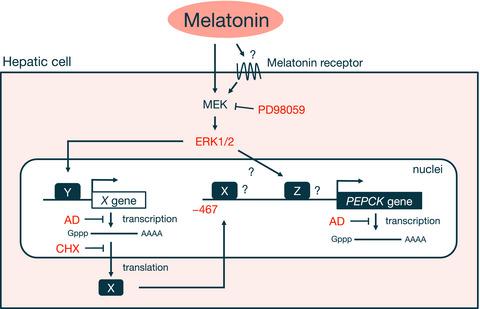当前位置:
X-MOL 学术
›
FEBS Open Bio
›
论文详情
Our official English website, www.x-mol.net, welcomes your
feedback! (Note: you will need to create a separate account there.)
Melatonin stimulates transcription of the rat phosphoenolpyruvate carboxykinase gene in hepatic cells
FEBS Open Bio ( IF 2.8 ) Pub Date : 2020-10-18 , DOI: 10.1002/2211-5463.13007 Kosuke Asano 1 , Akiko Tsukada 1 , Yuki Yanagisawa 2 , Mariko Higuchi 2 , Katsuhiro Takagi 1, 2 , Moe Ono 3 , Takashi Tanaka 3 , Koji Tomita 3 , Kazuya Yamada 1, 2
FEBS Open Bio ( IF 2.8 ) Pub Date : 2020-10-18 , DOI: 10.1002/2211-5463.13007 Kosuke Asano 1 , Akiko Tsukada 1 , Yuki Yanagisawa 2 , Mariko Higuchi 2 , Katsuhiro Takagi 1, 2 , Moe Ono 3 , Takashi Tanaka 3 , Koji Tomita 3 , Kazuya Yamada 1, 2
Affiliation

|
Melatonin plays physiological roles in various critical processes, including circadian rhythms, oxidative stress defenses, anti‐inflammation responses, and immunity; however, the current understanding of the role of melatonin in hepatic glucose metabolism is limited. In this study, we examined whether melatonin affects gene expression of the key gluconeogenic enzyme, phosphoenolpyruvate carboxykinase (PEPCK). We found that melatonin treatment increased PEPCK mRNA levels in rat highly differentiated hepatoma (H4IIE) cells and primary cultured hepatocytes. In addition, we found that melatonin induction was synergistically enhanced by dexamethasone, whereas it was dominantly inhibited by insulin. We also report that the effect of melatonin was blocked by inhibitors of mitogen‐activated protein kinase/extracellular signal‐regulated protein kinase (MAPK/ERK), RNA polymerase II, and protein synthesis. Furthermore, the phosphorylated (active) forms of ERK1 and ERK2 (ERK1/2) increased 15 min after melatonin treatment. We performed luciferase reporter assays to show that melatonin specifically stimulated promoter activity of the PEPCK gene. Additional reporter analysis using 5′‐deleted constructs revealed that the regulatory regions responsive to melatonin mapped to two nucleotide regions, one between −467 and −398 nucleotides and the other between −128 and +69 nucleotides, of the rat PEPCK gene. Thus, we conclude that melatonin induces PEPCK gene expression via the ERK1/2 pathway at the transcriptional level, and that induction requires de novo protein synthesis.
中文翻译:

褪黑激素刺激肝细胞中大鼠磷酸烯醇式丙酮酸羧激酶基因的转录
褪黑激素在各种关键过程中发挥生理作用,包括昼夜节律、氧化应激防御、抗炎反应和免疫;然而,目前对褪黑激素在肝脏葡萄糖代谢中的作用的了解是有限的。在这项研究中,我们检查了褪黑激素是否影响关键糖异生酶磷酸烯醇丙酮酸羧激酶 (PEPCK) 的基因表达。我们发现褪黑激素治疗增加了大鼠高度分化的肝细胞瘤 (H4IIE) 细胞和原代培养的肝细胞中的 PEPCK mRNA 水平。此外,我们发现地塞米松可协同增强褪黑激素的诱导作用,而胰岛素则主要抑制它。我们还报告说,褪黑激素的作用被丝裂原活化蛋白激酶/细胞外信号调节蛋白激酶 (MAPK/ERK)、RNA 聚合酶 II 和蛋白质合成的抑制剂阻断。此外,在褪黑激素处理后 15 分钟,ERK1 和 ERK2 (ERK1/2) 的磷酸化(活性)形式增加。我们进行了荧光素酶报告基因检测,以表明褪黑激素特异性刺激了PEPCK基因。使用 5' 缺失构建体的额外报告基因分析显示,对褪黑激素有反应的调节区映射到大鼠PEPCK基因的两个核苷酸区域,一个介于 -467 和 -398 个核苷酸之间,另一个介于 -128 和 +69 个核苷酸之间。因此,我们得出结论,褪黑激素通过转录水平的 ERK1/2 途径诱导PEPCK基因表达,并且这种诱导需要从头合成蛋白质。
更新日期:2020-12-03
中文翻译:

褪黑激素刺激肝细胞中大鼠磷酸烯醇式丙酮酸羧激酶基因的转录
褪黑激素在各种关键过程中发挥生理作用,包括昼夜节律、氧化应激防御、抗炎反应和免疫;然而,目前对褪黑激素在肝脏葡萄糖代谢中的作用的了解是有限的。在这项研究中,我们检查了褪黑激素是否影响关键糖异生酶磷酸烯醇丙酮酸羧激酶 (PEPCK) 的基因表达。我们发现褪黑激素治疗增加了大鼠高度分化的肝细胞瘤 (H4IIE) 细胞和原代培养的肝细胞中的 PEPCK mRNA 水平。此外,我们发现地塞米松可协同增强褪黑激素的诱导作用,而胰岛素则主要抑制它。我们还报告说,褪黑激素的作用被丝裂原活化蛋白激酶/细胞外信号调节蛋白激酶 (MAPK/ERK)、RNA 聚合酶 II 和蛋白质合成的抑制剂阻断。此外,在褪黑激素处理后 15 分钟,ERK1 和 ERK2 (ERK1/2) 的磷酸化(活性)形式增加。我们进行了荧光素酶报告基因检测,以表明褪黑激素特异性刺激了PEPCK基因。使用 5' 缺失构建体的额外报告基因分析显示,对褪黑激素有反应的调节区映射到大鼠PEPCK基因的两个核苷酸区域,一个介于 -467 和 -398 个核苷酸之间,另一个介于 -128 和 +69 个核苷酸之间。因此,我们得出结论,褪黑激素通过转录水平的 ERK1/2 途径诱导PEPCK基因表达,并且这种诱导需要从头合成蛋白质。











































 京公网安备 11010802027423号
京公网安备 11010802027423号